The trail of the Israeli offensive in the West Bank: ‘The feeling is that they are not coming in for someone, they are coming in for blood’
The Israeli army left a trail of destruction, with four people killed, damage from air strikes, bulldozed streets and shattered doors and windows in the Fara’a refugee camp, the first location from which it has withdrawn
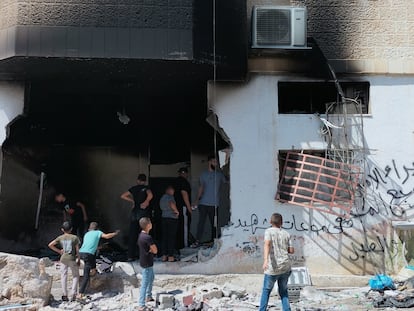

The Israeli soldiers and armored vehicles have just withdrawn. And everyone — from the residents who sweep up the broken windows of their stores or fix the windscreens of their cars to the militiamen who with M16 rifles on their shoulders and a ribbon on their foreheads with the legend “There is no god but Allah” — who dares to emerge into the streets again amid the admiring gaze of children, agree on one thing: never had the Israeli army launched an operation here lasting so long (32 hours), or so aggressively, since October 7, 2023, when raids and deaths in the West Bank skyrocketed in parallel to the invasion of Gaza.
The elderly Ahmed illustrates this standing next to the twisted door of his building, which soldiers blew open to gain access and handcuff him: the missile against a mosque dozens of meters away “sounded weaker than in the Gaza videos, but closer.” This is not Gaza, but Fara’a, a refugee camp next to the city of Tubas and one of the three points in the northern West Bank where the Israeli army on Wednesday initiated one of its biggest offensives in the area since the Second Intifada (2000-2005), which has already left 18 people dead. Fara’a was the lowest priority for Israel: a relatively brief and localized operation compared to Jenin and Tulkarem, where troops are expected to remain for several days, supported by drones and armored vehicles.
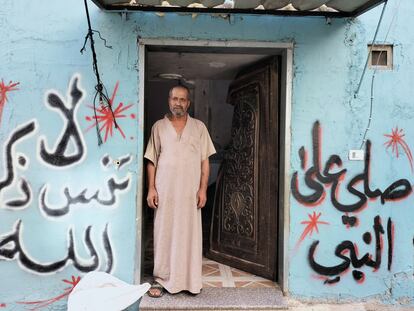
Hazim Na’ya thought of taking his brother to the hospital in Jenin, upon finding him wounded. Three drone strikes had hit the second floor of his building, and the rooftop. As is customary in the Middle East, his family lives in the same building and Hazim lives on the third floor. After the bombing, he found rubble blocking his path and “in the dust and in the dark” (the army cut off electricity as soon as the raid began) tried to reach his brother, guided by his cries of “Help, I am wounded!”
“When I saw him, he was wounded in the chest, but all he kept saying was, ‘The children, the children! They were upstairs!’ We went up to the roof and understood that it had been a direct hit, because Murad [14 years old] was headless. Then we had to pick up the parts. Mohamed [his brother, two years older] was also dead. I couldn’t do anything there anymore, so I focused on getting my brother to the hospital. I thought about Jenin, but it was surrounded. There is only one ambulance here and I couldn’t get there because the soldiers opened fire as it approached. We spent two and a half hours waiting for it to arrive. My sister is a nurse and she was able to take care of him a little,” Hazim recalls.
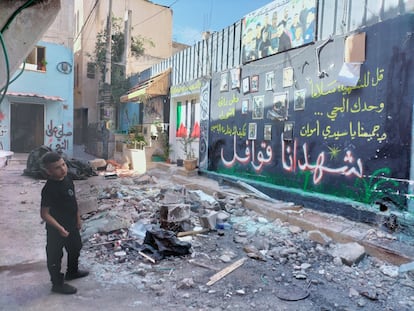
In view of the situation, Hazim threw his brother on his back and carried him to the ambulance, which took an hour and a half to reach Nablus, “on a secondary road full of rocks.” He shows a video on his mobile phone of him carrying his brother in the dark, and another of him bleeding from the head, but he does not want to share them. “No one has to see what I saw,” he says. In addition to his two nephews, a third has been left with such serious injuries that “it depends on God’s mercy.”
Hazim recounts this in front of a municipal hall that normally hosts weddings or other events where residents of Fara’a celebrate happiness together. Today, over 100 men wearing different expressions come to offer their condolences to the relatives. Because his brother is so weak, Hazim greets his neighbours, who shake his hand and offer the usual message: “May God have mercy on them.” Paradoxically, he says, the Israeli troops used the place for interrogations on Wednesday.
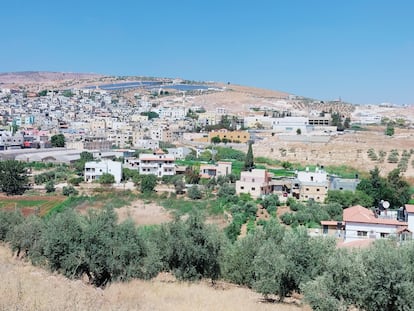
The four teenagers are “martyrs of Zionist terrorism,” as the banner in Arabic that some friends put up at the entrance to the hall reads. It does not bear the logo of any armed faction, but of the Palestine Liberation Organization, to which Islamic Jihad, the main target of the Israeli offensive, does not belong. To their families, they were just kids playing; to Israel, they were terrorists. Be that as it may, minors in Palestinian refugee camps take up arms at ages when most only fight in video games. And, amid the bulldozed streets and signs of gunfire at a hospital run by the United Nations Refugee Agency, it doesn’t look like that’s about to change.
In front of the blackened facade of the bombed mosque, two militiamen suddenly emerge with their rifles. “Since the war started in Gaza, the feeling is that they are not coming in for someone, they are coming in for blood,” says one of them. “This was the most aggressive attack. Everything that was forbidden is now allowed. But they don’t realize that the more aggressive they are, the more people here are motivated to join the resistance,” says another as he fiddles with the magazine of his weapon. Next to him, a mural recalls the “martyrs” of previous Israeli raids with graffiti to underline that their memory transcends generations.
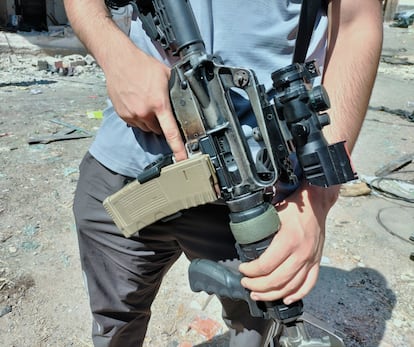
Hassan is philosophical about spending eight hours handcuffed together with his two nephews because, he says, being 63 years old, they secured his hands in front of his body (not behind, like his relatives), hardly tightening them, which is why he was able to free himself first when the soldiers left without releasing them, and he was allowed him to go to the bathroom. His nephews got the worst of it: “The first thing the soldiers did when they came in was separate the men from the women and children and take away all the cell phones. They asked my nephew for the PIN and he said he didn’t know it, that it was his wife’s. They made me call his father and told him: ‘It would be a pity if you don’t give it to us and we beat the kids until you end up giving it to us anyway. The result will be the same.’”
The soldiers got the number, obviously, and Hassan says that they found a photo on the phone of one of his nephews posing with a gun next to militiamen. “They hit him pretty hard then,” he adds, although they did not arrest him. What worries him most now is that they blew up the entrance door to his building and he barely earns between 30 and 100 shekels a day (between $8.20 and $27.40) from selling the cucumbers he picks.
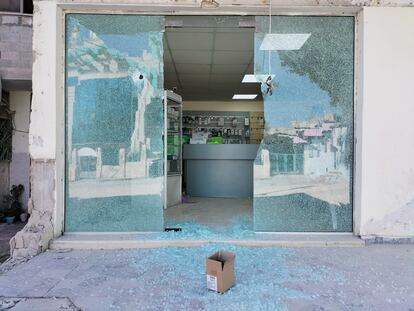
The militiamen leave within minutes: a military helicopter appears in the sky and a rumor circulates that the army is massing troops at a nearby checkpoint, which could indicate an imminent return to the camp. At the checkpoint, an endless queue of vehicles awaits the nonchalant search of two Israeli soldiers who, like the militiamen in Fara’a, are barely out of their teens. A barrier cuts off the quickest route to the camp and the military gives the order not to turn onto an extension of Highway 60, opened last year under pressure from settler leaders, because of the danger of passing through the Palestinian village of Huwara. Today it is empty because the settlers in the area (particularly radical ones) continue to cross through Huwara to — as they say — “show a Jewish presence.”
Sign up for our weekly newsletter to get more English-language news coverage from EL PAÍS USA Edition
Tu suscripción se está usando en otro dispositivo
¿Quieres añadir otro usuario a tu suscripción?
Si continúas leyendo en este dispositivo, no se podrá leer en el otro.
FlechaTu suscripción se está usando en otro dispositivo y solo puedes acceder a EL PAÍS desde un dispositivo a la vez.
Si quieres compartir tu cuenta, cambia tu suscripción a la modalidad Premium, así podrás añadir otro usuario. Cada uno accederá con su propia cuenta de email, lo que os permitirá personalizar vuestra experiencia en EL PAÍS.
¿Tienes una suscripción de empresa? Accede aquí para contratar más cuentas.
En el caso de no saber quién está usando tu cuenta, te recomendamos cambiar tu contraseña aquí.
Si decides continuar compartiendo tu cuenta, este mensaje se mostrará en tu dispositivo y en el de la otra persona que está usando tu cuenta de forma indefinida, afectando a tu experiencia de lectura. Puedes consultar aquí los términos y condiciones de la suscripción digital.








































